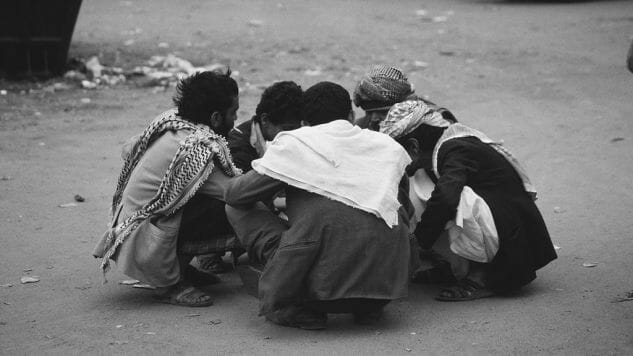Congress, Stop Subsidizing the Misery of Yemen
Washington loves both fuel and fire
Frances M. Ginter / Getty
Congress skipped a chance to set things right. Naturally, it was terribly surprising to see that great deliberative body on the shady side of a moral question, but there’s a first time for everything. Samuel Oakford writes that
… the House of Representatives just passed over the chance to vote on legislation that would have tracked the fuel the Pentagon gives to the Saudi coalition and prohibited refueling of coalition aircraft unless the Pentagon could assure Congress that subsequent missions wouldn’t hit civilians or targets contained on no-strike lists. An amendment to the National Defense Authorization Act, filed by Democratic Congressman Ro Khanna of California with bipartisan support, failed to pass the Rules Committee last night, and so it won’t be up for a vote. Khanna’s amendment would have “at the very least require[d] reporting to Congress about exactly how many flights are being refueled, where the location is and verification that they aren’t involved in civilian deaths,” the Congressman told The Intercept.
The Americans back the Saudi Coalition in Yemen, including the funeral strike that wiped out 130 people in October 2016. We have been aiding the Kingdom and its friends since March 2015, when they asked us to help them fight the Houthi rebels. Let’s step back, to about a year ago. Suppose you are the President and Congress of a free people. You receive word that your forces have just disbarred a large collection of human beings from the business of existence. People who you had no disagreement with. What would you do, if you received such news? Perhaps you might consider whose store you were minding, whose work you were doing.
Most of us would. But, crying shame, what actually happened is somewhat different. After that funeral bombing, did we retreat a step? Reconsider our efforts? Take seriously our open-mouthed pieties about human rights? We explored none of those options, as the liquor-cabinet-looting teen swore to his parents. The American government didn’t back down for a single moment. Obama stopped selling weapons but kept feeding the war. He and the Legislative Branch kept gifting princes with boodle and kindnesses. We helped them bomb, and smiled as they bombed. And Trump and his Congress of withered suburban vampires will keep the fuel train rolling into Saudi pockets to dismember Yemenis. As Samuel Oakford reminds us:
Yet in the months following that strike, the United States doubled the amount of fuel it provided to coalition jets, according to figures obtained from the U.S. military. The numbers underline the fact that U.S. support for the campaign has continued and even increased despite growing attention to civilian casualties and alleged war crimes by the coalition.
Congress foots the bill for their planes. What does it matter that Obama put the hold on selling guided weapons to the Saudis? He kept on giving the Saudi Coalition fuel, double the amount of fuel before the strike. The government wags a finger, then writes a check.
We help with Emirate prisons and conduct special forces operations in this conflict. But mostly our displays of valor are mostly constrained to supply and support. Yet as war crimes tribunals remind us, there are no small parts, only small actors. We have given 67 million pounds of fuel to the repressive regimes of the Gulf. The UN claims the Kingdom’s coalition has killed about three thousand people. The Houthis are not blameless. But there is no reason for Americans to carry oceans of water to protect Saudi hegemony.
YOU GET WHAT YOU PAY FOR
What has our glorious adventure in Yemen brought us? The near-starvation of the Yemeni. Seven million of them are near to man-made famine, as I write this. Add this to the death of bystanders, civilian losses …and still the coalition chugs along. The brutish killings continue, and Washington will keep paying for it.
But there is a way out. Oakford reports:
“Most of the refueling does not actually go to specifically Saudi Air Force aircraft,” said Pentagon spokesperson Maj. Adrian Rankine-Galloway. “The Emirati Air Force are the primary air force that we help refuel.” The United Arab Emirates has taken on an increasingly active role in Yemen, running ground campaigns along the western coast and against Al Qaeda targets in the South. Operations along the coast include troops from Sudan, a country that the US currently sanctions. The Pentagon has weighed how deeply to back a proposed UAE-led operation to capture Yemen’s largest port, Hodeidah, from the Houthis.
-

-

-

-

-

-

-

-

-

-

-

-

-

-

-

-

-

-

-

-

-

-

-

-

-

-

-

-

-

-

-

-

-

-

-

-

-

-

-

-








































